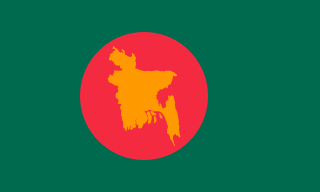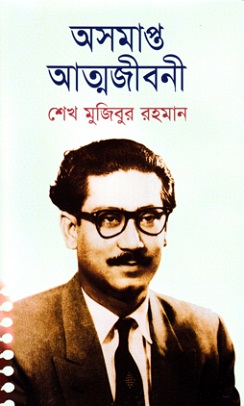Related Research Articles

Sheikh Mujibur Rahman, popularly known by the honorific prefix Bangabandhu, was a Bangladeshi politician, revolutionary, statesman, activist and diarist. As a politician, Mujib had held continuous positions either as Bangladesh's president or as its prime minister from April 1971 until his assassination in August 1975. Mujib successfully led the Bangladeshi independence movement and restored the Bengali sovereignty after over two centuries following the Battle of Plassey in 1757, for which he is honoured as the 'Father of the Nation' in Bangladesh. In 2011, the fifteenth constitutional amendment in Bangladesh referred to Sheikh Mujib as the Father of the Nation who declared independence; these references were enshrined in the fifth, sixth, and seventh schedules of the constitution. His Bengali nationalist ideology, socio-political theories, and political doctrines are sometimes called Mujibism.

The Bangladesh Awami League, often simply called the Awami League or AL, is one of the major political parties in Bangladesh. The oldest existing political party in the country, Awami League successfully lead Bangladesh to the independence. One of the two most dominant parties in the country, along with its archrival Bangladesh Nationalist Party, it has been the ruling party since 2009, and has since been described as authoritarian.
Syed Nazrul Islam was a Bangladeshi politician and a senior leader of the Awami League. During the Bangladesh Liberation War, he was declared as the Vice President of Bangladesh by the Provisional Government. He served as the Acting President in the absence of Sheikh Mujibur Rahman.

Independence of Bangladesh was declared on 26 March 1971, celebrated as Independence Day, from Pakistan. The Independence Day of Bangladesh is celebrated on 26 March when Sheikh Mujibur Rahman declared the independence of Bangladesh. The Bangladesh Liberation War started on 26 March and lasted till 16 December 1971 which is celebrated as Victory Day in Bangladesh. There is a dispute along partisan line on who declared the Independence of Bangladesh. The Awami League claim Sheikh Mujibur Rahman while the Bangladesh Nationalist Party claim it was Ziaur Rahman.

Tajuddin Ahmad was a Bangladeshi politician. He led the Provisional Government of Bangladesh as its prime minister during the Bangladesh Liberation War in 1971 and is regarded as one of the most instrumental figures in the birth of Bangladesh.

Ataur Rahman Khan was a Bangladeshi lawyer, politician and writer, and served as Chief Minister of East Pakistan from 1 September 1956 – March 1958, and as the Prime Minister of Bangladesh from 30 March 1984 to 9 July 1986.

The All Parties Democratic Movement (APDM) was a Pakistani political alliance consisting of thirty-two parties opposed to the military rule of Pervez Musharraf. Some parties boycotted the elections.

The Asiatic Society of Bangladesh is a non political and non profit research organisation registered under both Society Act of 1864 and NGO Affairs Bureau, Government of Bangladesh. The Asiatic Society of Bangladesh was established as the Asiatic Society of East Pakistan in Dhaka in 1952 by a number of Muslim leaders, and renamed in 1972. Ahmed Hasan Dani, a noted Muslim historian and archaeologist of Pakistan played an important role in founding this society. He was assisted by Muhammad Shahidullah, a Bengali linguist. The society is housed in Nimtali, walking distance from the Curzon Hall of Dhaka University, locality of Old Dhaka.

The Independence Day of Bangladesh is celebrated on 26 March as a national holiday in Bangladesh. It commemorates the country's declaration of independence from Pakistan in the early hours of March 26, 1971.

Pakistan and Bangladesh are both South Asian Muslim-majority countries. Following the end of British rule in India, the two countries formed a single state for 24 years. The Bangladesh Liberation War in 1971 resulted in the secession of East Pakistan as the People's Republic of Bangladesh. Pakistan recognized Bangladesh in 1974. Today, bilateral relations between Bangladesh and Pakistan are considered to be cordial.

The 7th March Speech of Bangabandhu, or the 7/3 Speech, was a public speech given by Sheikh Mujibur Rahman, the Founding Father of Bangladesh on 7 March 1971 at the Ramna Race Course in Dhaka to a gathering of over one million (1,000,000) people. It was delivered during a period of escalating tensions between East Pakistan and the powerful political and military establishment of West Pakistan. In the speech, Bangabandhu informally declared the independence of Bangladesh, proclaiming: "The struggle this time, is a struggle for our liberty. The struggle this time, is a struggle for our independence." He announced a civil disobedience movement in the province, calling for "every house to turn into a fortress".

The 1969 East Pakistan uprising was a democratic political uprising in East Pakistan. It was led by the students backed by various political parties such as the Awami League and National Awami Party and specially their student wings against Muhammad Ayub Khan, the president of Pakistan in protest of the military rule, political repressions, Agartala Conspiracy Case and the incarceration of Sheikh Mujibur Rahman and other Bengali nationalists.

Abdul Hamid Khan Bhashani, often shortened as Maulana Bhashani, was a Bengali politician. His political tenure spanned the British colonial India, Pakistan and Bangladesh periods. Maulana Bhashani was popularly known by the honorary title Mozlum Jananeta for his lifelong stance advocating for the poor. He gained nationwide mass popularity among the peasants and helped to build the East Pakistan Peasant Association. Owing to his political leaning to the left, often dubbed Islamic Socialism. he was also called 'The Red Maulana'. He is considered as one of the main pillars of Bangladeshi independence of 1971.

The Unfinished Memoirs is the autobiography by Sheikh Mujibur Rahman, Father of the nations of Bangladesh.

The movement demanding trial of war criminals is a protest movement in Bangladesh, from 1972 to present demanding trial of the perpetrators of 1971 Bangladesh genocide during the Bangladesh Liberation War from Pakistan.

Awami League, known as Awami Muslim League before 1955, was an East Pakistan-based Pakistani political party founded by Huseyn Shaheed Suhrawardy in February 1950. Pir of Manki Sharif and Khan Ghulam Mohammad Khan from the North-West Frontier Province (NWFP) joined it soon afterwards.

Sheikh Rehana Siddiq is a Bangladesh Awami League politician. She is the younger sister of the current Prime Minister Sheikh Hasina and the daughter of the first President of Bangladesh Sheikh Mujibur Rahman. She is also the mother of Tulip Siddiq, a British Labour Party politician and elected Member of Parliament and City Minister.
The non-cooperation movement of 1971 was a historical movement in then East Pakistan by the Awami League and the general public against the military government of Pakistan in March of that year. After the announcement of the suspension of the session of the National Assembly of Pakistan on 1 March, the spontaneous movement of the people started, but officially on the call of Sheikh Mujibur Rahman, the non-cooperation movement started on 2 March and continued until 25 March. The movement lasted for a total of 25 days.

Bangladesh–Belgium relations refers to bilateral relations between Bangladesh and Belgium. Bangladesh has a resident ambassador in Brussels who is also the ambassador of Bangladesh to Luxembourg. Belgium has a non resident ambassador in New Delhi.
Provincial elections were held in East Pakistan on 17 December 1970, ten days after general elections. A total of 1,850 candidates ran for the 300 seats in the East Pakistan Provincial Assembly. The result was a landslide victory for the Awami League, which won 288 of the 300 seats.
References
- 1 2 Mannan, Abdul (2020-03-17). "Sheikh Mujib: A natural born leader". The Daily Star. Retrieved 2021-08-04.
- ↑ Morshed, Adnan Zillur (2020-03-20). "Bangabandhu and the Bengal Delta". The Daily Star. Retrieved 2021-08-04.
